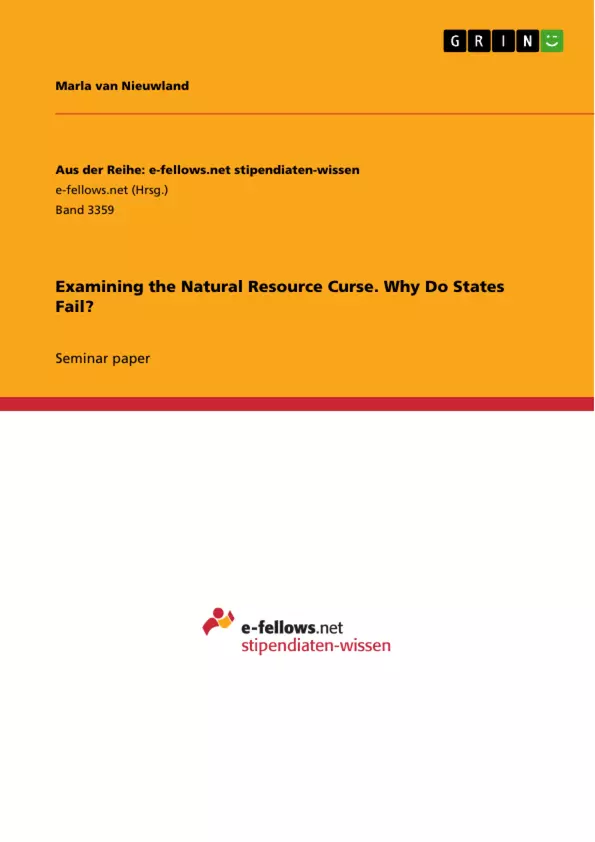The phenomenon of a "natural resource curse" has been observed in various settings and is a widely accepted theory. However, a research gap exits when it comes to the effect of natural resources on state failure. Qualitative literature suggests natural resources could have a negative effect on the stability of a state, however, a quantitative data analysis has yet to confirm this expectation.
This study therefore examines the relationship between oil and mineral wealth and the fragility of a state and investigates the research question "why do some states fail, while others do not?". After running a binomial logistic regression, the results suggest that oil wealth significantly fosters state fragility, while the effect of mineral wealth, although being generally as anticipated, is too small to be significant. The results can be regarded as a partial confirmation of the resource curse theory, although the lack of significance of the variable ‘mineral wealth’ spurs further research.
Inhaltsverzeichnis (Table of Contents)
- Abstract
- 1. Introduction
- 2. Definitions
- 3. Literature Review
- 4. Theory
- 5. Research Design
- 6. Findings
- 7. Limitations
- 8. Conclusion
- 9. Bibliography
- I. List of Figures
- II. List of Abbreviations
- III. Data (CLIPPING)
- IV. Code (CLIPPING)
Zielsetzung und Themenschwerpunkte (Objectives and Key Themes)
This study examines the relationship between oil and mineral wealth and the fragility of a state, seeking to answer the research question: "why do some states fail, while others do not?". The study aims to explore the resource curse theory and its effects on state failure, specifically focusing on the role of oil and mineral resources.
- The impact of natural resources on state stability
- The resource curse theory and its implications
- The relationship between oil and mineral wealth and state fragility
- The role of resource dependency in state failure
- Testing the resource curse theory through quantitative data analysis
Zusammenfassung der Kapitel (Chapter Summaries)
- Abstract: The abstract presents a brief overview of the research, highlighting the resource curse theory, the study's aim to examine the relationship between natural resource wealth and state fragility, and the key findings of the study.
- Introduction: The introduction introduces the concept of the natural resource curse, presenting anecdotal evidence of resource-rich countries experiencing instability and state failure. It also acknowledges the existence of resource-rich countries with high growth and introduces the research question: "Why do some states fail, while others do not?".
- Definitions: This chapter provides definitions of key terms, particularly that of a "failed state" based on the Fund for Peace organization's criteria. It also discusses the challenges in applying this label to countries and the complexities surrounding the determination of a state's "failed" status.
Schlüsselwörter (Keywords)
The key terms and focus topics of this research include the resource curse, state failure, oil wealth, mineral wealth, state fragility, quantitative data analysis, binomial logistic regression, and resource dependency.
Frequently Asked Questions
What is the "natural resource curse"?
The natural resource curse refers to the paradox that countries with an abundance of natural resources (like oil and minerals) often experience less economic growth and more political instability than countries with fewer resources.
How does oil wealth affect state stability?
Research suggests that high oil wealth significantly fosters state fragility and can increase the likelihood of state failure due to dependency and corruption.
What defines a "failed state"?
A failed state is typically defined by criteria such as the loss of physical control of its territory, the erosion of legitimate authority to make collective decisions, and the inability to provide public services.
Does mineral wealth have the same impact as oil wealth?
While mineral wealth is expected to have a negative effect, some studies show its impact on state fragility is smaller and less statistically significant compared to oil wealth.
Why do some resource-rich states succeed while others fail?
The outcome depends on various factors, including the quality of institutions, the level of resource dependency, and the government's ability to manage wealth transparently.
- Quote paper
- Marla van Nieuwland (Author), 2019, Examining the Natural Resource Curse. Why Do States Fail?, Munich, GRIN Verlag, https://www.grin.com/document/534855



